

Waifu. About Waifu is an Engrish term primarily used by Asian men to refer to one’s own wife.
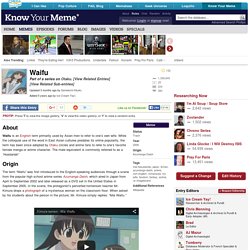
While the colloquial use of the word in East Asian cultures predates its online popularity, the term has been since adopted by Otaku circles and anime fans to refer to one’s favorite female manga or anime character. The male equivalent is commonly referred to as a “Husbando” Origin The term “Waifu” was first introduced to the English-speaking audiences through a scene from the popular high school anime series Azumanga Daioh, which aired in Japan from April to September 2002 and later released as a DVD set in the United States in September 2005. Spread The Engrish word “waifu” stuck with the English-speaking fans and throughout the latter half of 2000s, the term became heavily used by both anime fans and trolls on 4chan’s /a/ (anime & manga) board, as a term of endearment to refer to a female character and as a flamebait to mock the obsessive nature of the subculture, respectively. Dinner with Waifu. Wat. About “Wat” is a variant of the English word “what” that is often used to express confusion or disgust, much like its better known acronym “WTF,” short for “what the fuck.”
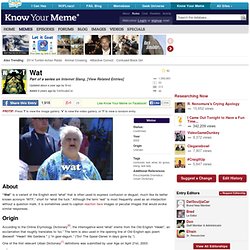
Although the term “wat” is most frequently used as an interjection without a question mark, it is sometimes used to caption reaction face images or peculiar images that would evoke similar responses. Origin According to the Online Etymology Dictionary, the interrogative word “what” stems from the Old English “Hwæt”, an exclamation that roughly translates to “so.” The term is also used in the opening line of Old English epic poem Beowolf: "Hwæt! One of the first relevant Urban Dictionary definitions was submitted by user Age on April 21st, 2003: A variation of the word “what”. Accordin to Encyclopedia Dramatica, colloquial use of the term “wat” originated from the Something Awful forums, specifically in the FYAD (F**k You and Die) sub-community. What I Watched / What I Expected / What I Got. About “What I Watched, What I Expected, What I Got” is an image macro series that consists of three visual metaphors on any given subject topic, with most iterations typically commentating on popular animes and videogames.
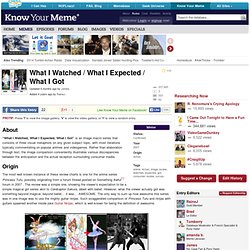
Rather than elaboration through text, the image comparison conveniently illustrates various discrepancies between the anticipation and the actual reception surrounding consumer media. Origin The most well known instance of these review charts is one for the anime series Princess Tutu, possibly originating from a forum thread posted on Something Awful forum in 2007 . The review was a simple one, showing the viewer’s expectation to be a simple magical girl series akin to Cardcaptor Sakura, albeit with ballet. Spread Summarizing a series using simple image concepts was an instant hit, as many results ending up either witty or hilarious. Notable Examples Blank Template External References. Wheaton's Law. About Wheaton’s Law is an internet axiom which states “Don’t be a dick.”
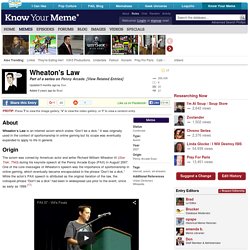
It was originally used in the context of sportsmanship in online gaming but its scope was eventually expanded to apply to life in general. Win / Epic Win / For The Win. WTF. About WTF is a shorthand expression for “what the fuck?”
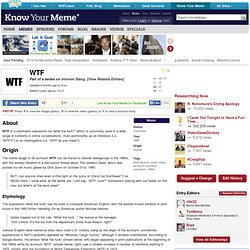
Which is commonly used in a wide range of contexts in online conversations, most prominently as an intensive (i.e. “WTF?!”) Or an interrogative (i.e. "WTF do you mean?). Origin The online usage of its acronym WTF can be traced to Usenet newsgroups in the 1980s, with the earliest iteration in a discussion thread about The Grateful Dead, which was posted via net.music.gdead by Dick Dunn on October 31st, 1985: BUT, can anyone shed even a little light on the lyrics of China Cat Sunflower? Etymology The expression “what the fuck” has its roots in colloquial American English, with the earliest known iteration in print found in the 1983 fiction Handling Sin by American author Michael Malone. Gates hopped out of the cab. Various English word reference sites have cited U.S. military slang as the origin of the acronym, sometimes euphemized in NATO phonetic alphabet as “Whiskey Tango Foxtrot,” although it remains unattributed.
Spread.